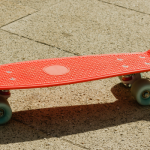Skateboarding, with its roots deeply embedded in the rebellious spirit of youth culture, has undergone numerous transformations since its inception.
Among the key components that dictate the performance and maneuverability of a skateboard, the trucks hold a pivotal role.
Traditionally crafted from durable metals like aluminum, trucks have recently undergone a paradigm shift with the introduction of plastic alternatives.
Plastic skateboard trucks have emerged as a divisive topic within the skating community, sparking debates about their efficacy and overall impact on the skateboarding experience.
While some riders swear by the benefits of plastic trucks, others remain skeptical, expressing concerns about their durability and performance.
In this exploration of the world of skateboarding, we delve into the realm of plastic skateboard trucks, dissecting the pros and cons to help riders make informed decisions about their choice of hardware.
What is the difference between plastic and metal trucks?
The choice between plastic and metal trucks involves various factors, and understanding the differences can help riders make informed decisions based on their preferences and skateboarding style. Here are the key distinctions between plastic and metal skateboard trucks:
Material:
- Plastic Trucks:
- Composition: Typically made from high-grade polymers or composite materials.
- Characteristics: Lightweight and flexible.
- Metal Trucks:
- Composition: Typically crafted from aluminum alloy or other metals.
- Characteristics: Sturdy and durable.
Weight:
- Plastic Trucks:
- Advantage: Lightweight.
- Impact: Enhances maneuverability and agility, making them popular among street skaters and those who prioritize tricks.
- Metal Trucks:
- Advantage: Heavier.
- Impact: Provide stability and are often favored by riders who skate at high speeds or on ramps and bowls.
Durability:
- Plastic Trucks:
- Concern: Often perceived as less durable than metal trucks, especially under high-impact scenarios.
- Suitability: Some riders may find plastic trucks less suitable for intense tricks and jumps.
- Metal Trucks:
- Strength: Generally more robust and capable of withstanding heavy use.
- Suitability: Preferred by riders engaged in high-impact skateboarding, such as vert skating or jumping down stairs.
Vibration Dampening:
- Plastic Trucks:
- Advantage: Effective at dampening vibrations, leading to a smoother ride.
- Benefit: Provides comfort, particularly on rough or uneven surfaces.
- Metal Trucks:
- Characteristic: Transmit vibrations more directly to the rider.
- Consideration: Some riders may find the increased feedback beneficial for certain styles of skateboarding.
Cost:
- Plastic Trucks:
- Advantage: Generally more affordable.
- Appeal: Attracts beginners and budget-conscious riders.
- Metal Trucks:
- Cost: Tend to be more expensive.
- Investment: Considered a long-term investment due to their durability.
Customization:
- Plastic Trucks:
- Variety: Available in a wide range of colors and styles.
- Expression: Allow riders to express individuality through personalized setups.
- Metal Trucks:
- Limited Variety: Traditionally come in standard metal finishes.
- Customization: Some customization options but generally less diverse than plastic trucks.
Pros of Plastic Skateboard Trucks:
Plastic skateboard trucks have garnered a considerable following over the years, with riders drawn to their unique characteristics and performance benefits. Let’s take a closer look at some of the advantages of plastic trucks:
Lightweight Advantage:
Plastic skateboard trucks boast a significant advantage in terms of weight.
Being inherently lighter than their metal counterparts, plastic trucks contribute to a skateboard’s overall agility and maneuverability.
This characteristic is particularly appealing to riders who prioritize executing intricate tricks and technical maneuvers, as the reduced weight enhances responsiveness.
Budget-Friendly Option:
Affordability stands out as a key advantage of plastic skateboard trucks.
In comparison to their metal counterparts, plastic trucks are often more wallet-friendly.
This cost-effective feature makes them a highly attractive option, especially for beginners or riders on a tight budget who are eager to join the skateboarding community without incurring a substantial financial investment.
Vibration Dampening:
Plastic trucks excel in dampening vibrations, offering riders a smoother and more comfortable ride.
The inherent properties of plastic allow it to absorb and dissipate vibrations more effectively than metal trucks.
This becomes particularly beneficial when navigating rough or uneven surfaces, enhancing the overall skateboarding experience by minimizing discomfort associated with vibrations.
Customization Opportunities:
A notable feature of plastic skateboard trucks is the wide range of customization options available.
Manufacturers produce plastic trucks in a variety of colors and styles, providing riders with the freedom to personalize their setups according to their aesthetic preferences.
This customization factor is highly appealing to skateboarders who view their gear as an extension of their personal style, allowing them to express their individuality through vibrant and unique skateboard components.
Cons of Plastic Skateboard Trucks:
While plastic trucks offer notable benefits, it’s crucial to consider their limitations. Here, we explore the cons associated with plastic skateboard trucks:
Durability Concerns:
One of the primary drawbacks revolves around durability concerns.
Despite advancements in design and materials, there exists a perception that plastic skateboard trucks may not withstand the demanding conditions of intense skateboarding sessions.
Skepticism arises, particularly among riders who regularly engage in high-impact tricks and jumps.
Limited Load Capacity:
Plastic trucks may have limitations in supporting heavier riders.
In comparison to their metal counterparts, plastic trucks are perceived to be less robust and may struggle with heavier loads.
This limitation makes metal trucks a preferred choice for riders with a larger physique who require sturdier equipment.
Performance Issues:
Some skateboarders argue that plastic trucks do not offer the same level of performance and responsiveness as their metal counterparts.
Concerns about precision and control in executing tricks may deter riders who prioritize high-performance equipment.
The perceived discrepancy in responsiveness becomes a significant consideration for those seeking optimal maneuverability.
Heat Sensitivity:
Plastic has the potential to warp or deform under high temperatures.
In hot climates or after prolonged use, plastic skateboard trucks may exhibit issues related to heat sensitivity.
This can compromise their structural integrity over time, leading to concerns about long-term performance and reliability.
FAQs
Are plastic skateboard trucks suitable for all forms of skateboarding?
No, plastic trucks are generally preferred by riders engaged in high-impact skateboarding styles such as vert skating or jumping down stairs. They may not be as suitable for technical street skating or heavy-duty downhill riding.
Do plastic skateboard trucks offer good vibration dampening?
Yes, one of the key advantages of plastic trucks is their ability to absorb and dissipate vibrations, providing a smoother ride.
Are plastic skateboard trucks more affordable than metal trucks?
Yes, in general, plastic trucks tend to be more budget-friendly than metal trucks. They are often favored by beginners or riders on a tight budget.
Can I customize my plastic skateboard trucks?
Yes, plastic trucks offer a wide range of customization options, allowing riders to personalize their setups according to their aesthetic preferences.
Are there any durability concerns with plastic skateboard trucks?
Yes, some riders have expressed concerns about the overall durability of plastic trucks, particularly for intense skateboarding styles and heavier loads. However, advancements in design and materials have improved the durability of plastic trucks significantly.
Are plastic skateboard trucks suitable for heavier riders?
Plastic trucks may have limitations in supporting heavier weights, so metal trucks are generally preferred by riders with a larger physique. However, some manufacturers offer sturdier and reinforced plastic truck options that can support heavier loads.
![Why do skateboarders hate scooters? [Reasons + Tips] Why do skateboarders hate scooters? [Reasons + Tips]](https://bedoper.site/wp-content/uploads/2023/04/Why-do-skateboarders-hate-scooters-150x150.png)


![How fast do skateboards go downhill? [90 mph (145 km/h)] How fast do skateboards go downhill? [90 mph (145 km/h)]](https://bedoper.site/wp-content/uploads/2023/04/How-fast-do-skateboards-go-downhill-150x150.png)
